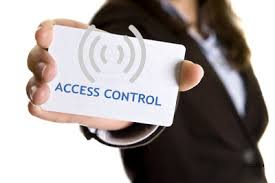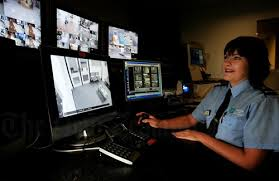The traditional approach to condo security includes security guards, doormen and electronic doors or gates. All provide a visible deterrent to individuals intent on committing damage, mischief or theft. Residents feel secure when they see physical security.
Electronic security options provide additional benefits. These include a level of consistency that does not exist with people.
Some condo buildings that have replaced security personnel with electronic security options, such as video and cameras, have learned the importance of a physical presence. There are too many ways for individuals to circumvent video and electronic technology. A physical presence is essential to determine when this has occurred. When someone has been injured, a person is needed to comfort and reassure the individual.
CondoSecure installs and repairs condo security systems, and manufactures in-suite keypad systems. “At the most basic level”, according to Jeff Mullen, “security means that property doors are locked when required and areas are adequately lit. Beyond this basic level, security can take numerous forms depending on the needs and desires of each condo community.”
“At the most basic level security means that property doors are locked when required and areas are adequately lit. Beyond this basic level, security can take numerous forms depending on the needs and desires of each condo community.”
Jeff Mullen, CondoSecure
Cameras and Video Monitoring
Cameras and video monitoring is now common for indoor or outdoor purposes. Its value in identifying trespassers and their crimes, after a crime has been committed, is crucial to the recovery of stolen items and prosecution of individuals.
Networking the cameras means their feed can be viewed at a central security desk in real time or reviewed without having to leave the security desk.
Cameras can see more and catch every detail. People are prone to lapses in memory or recall, and can make mistakes. Important details missed by people can be reviewed when captured by camera.
Most condo corporations lack security personnel to constantly monitor video feeds. This can relegate video technology to identifying incidents after they have occurred and individuals involved.
Perimeter Protection
Fences, motion controlled lights and other features around a condo building promote safety and discourage interlopers.
Panic Alarms and In-Suite Alarm Systems
Panic alarms are personal security devices worn by individuals. They can be triggered by the individual if they fall or require assistance. These devices only work within a suite or limited area.
In-suite alarm systems can be connected to an off-site service that monitors for unauthorized entry to a suite, or to onsite security staff. The service can be instructed to contact police, condo building security desk or family members when an alarm is triggered.
Closed-Circuit Television and Intercom Systems
Closed circuit television (CCTV) allows condo residents to view a lobby or other visitor access area. An intercom system allows visitors to contact a building resident for building access. The resident can speak with a visitor through the intercom system, which may connect with the telephone system, while viewing the lobby area. Building residents can then determine if it is safe to provide a visitor with access to the building.
 Access Control
Access Control
Access control is usually thought of as “card/fob entry” but refers to how building access is handled overall.
A concierge or security guard may monitor a main door and grant access to the building or parking area. Building residents, while utilizing an intercom system, may be able to open a lobby door by entering a code using their telephone.
Access is also very commonly controlled through the use of keys and electronic fobs or access cards.
The Cloud
Internet technology is the current trend in security. It provides a way to enhance existing security technologies to provide greater value and service. The “cloud” refers to use of the Internet in place of purchasing and maintaining computer equipment, software and wiring.
One of its greatest advantages is mobility. Consumers have shown a preferred desire to receive information on their smartphones, tablets and desktop computers. Cloud computing integrates storage of information on an Internet site with programs and apps. Residents may be able to use their smartphone to allow visitors access to building property. They may be able to access closed-circuit television and intercom systems to see and speak with their guests, and to open lobby doors when appropriate.
Allowing residents to grant access to their visitors and deliveries allows security personnel to focus on other duties.
Cloud technology allows cameras, communications and electronic door access controls to seamlessly work together for use by condo residents. Remote security services are a relatively new way to integrate these technologies in locations where it is not practical to maintain a physical presence.
The best security system is one that considers the goals of the corporation, resident desires and existing systems. Experience suggests the best approach to security includes physical presence. Cost limitations and practicality suggest that physical security can be improved through use of video and camera technology and some form of access control.




